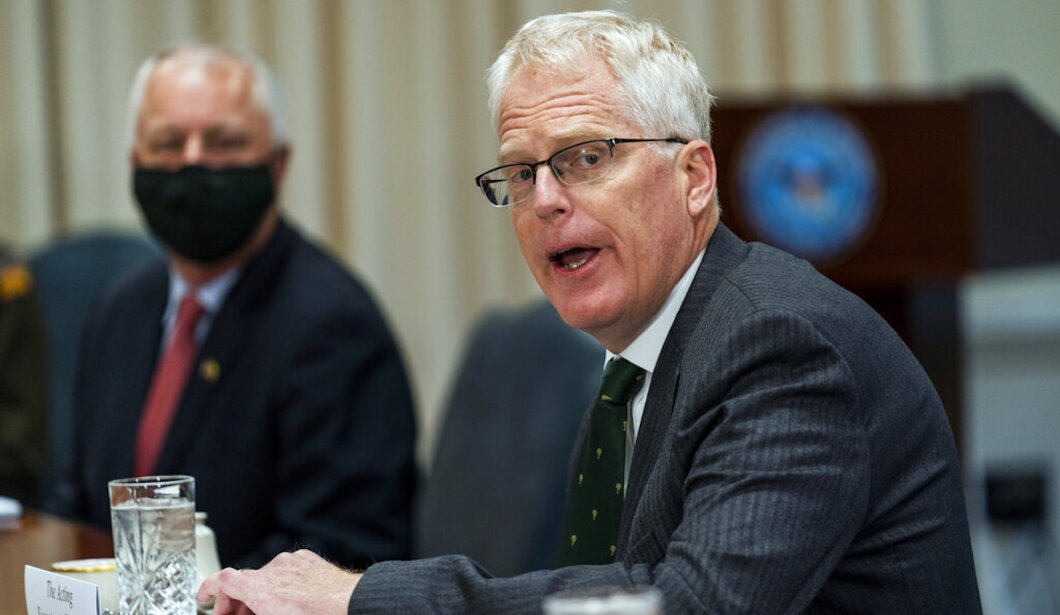
EXCLUSIVE — A new book by Christopher C. Miller, the acting secretary of defense in the final months of Donald Trump’s presidency, recounts his appointment to the post amid questions about his predecessor’s loyalty.
In an excerpt shared exclusively with the Washington Examiner, Miller explains how he waited in the wings for months before Trump moved to oust his Defense Secretary Mark Esper, a decision stalled by optics as the president sought to short-circuit sensational allegations that he had disparaged U.S. service members.
The drawn-out process hints at how some aides worked to quell preelection turbulence while others remained focused on excising perceived disloyalty until the end.
Miller’s account reveals how Trump’s advisers had pre-vetted him in the summer of 2020, fearing Esper could resign at any moment. The vetting was done by Trump’s then-29-year-old director of the Presidential Personnel Office, John McEntee, as Miller crucially held an already Senate-confirmed post.
Esper had garnered the derogatory nickname “Yesper” from Trump, who called him a “stiff” and claimed the name stemmed from his unceasing acquiescence. “He would do anything I wanted; that’s why I called him ‘Yesper,’” Trump later told 60 Minutes.
But White House aides did not view Esper as a loyalist and speculated how the defense secretary might attempt a dramatic public exit intended to draw a bright line between himself and Trump — what Miller calls a “pre-election ‘blaze of glory.’”
Fearing this outcome, Trump’s advisers considered whether the president should preemptively fire Esper “before he could turn on them,” Miller writes in Soldier Secretary: Warnings from the Battlefield & the Pentagon about America’s Most Dangerous Enemies.
A report by Jonathan Karl revealed how a memo from McEntee’s office cataloged Esper’s “sins against Trumpism,” including that he “barred the Confederate flag” on military bases, “opposed the President’s direction to utilize American forces to put down riots,” “focused the Department on Russia,” and was “actively pushing for ‘diversity and inclusion.’”
Yet the decision to oust the secretary stalled in the wake of a report in the Atlantic alleging that Trump had called U.S. service members who died in battle “suckers” and “losers.”

Not wanting to fuel the media firestorm, the president held back.
“For one thing, it might be interpreted as an act of retribution and lend credence to the story,” Miller writes. “At the very least, it would add to the perception of a chaotic administration entering the final stretch before the election, right when they wanted to be projecting competence and order.”
It wasn’t long before this calculus began to shift.
In the midst of a hostage rescue mission days before the presidential election, Esper “unexpectedly slammed on the brakes because the [Defense Department] and State Department had failed to notify Nigerian officials,” according to the book. The operation resumed, but for Trump, it was “the straw that broke the camel’s back.”
“In his view, Esper had an attitude problem,” Miller writes.
Less than a week after the election, Trump ousted Esper in a tweet and appointed Miller in his place.
“And just like that, it was go time,” recalls the acting Pentagon chief.
CLICK HERE TO READ MORE FROM THE WASHINGTON EXAMINER
Trump was elected in 2016 on the basis of his managerial acumen, but his personnel choices stirred controversy throughout his term and will likely be questioned as he seeks a second one in 2024.
Soldier Secretary: Warnings from the Battlefield & the Pentagon about America’s Most Dangerous Enemies will be available from Center Street on Feb. 7, 2023.







